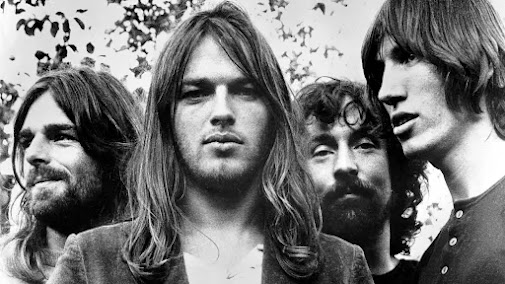Here’s the thing about time — you don’t know you’re wasting it until you’ve already spent it, like a drunk tourist blowing fifty bucks on a papier-mâché souvenir in Times Square and only realizing it won’t fit in your suitcase. Enter Time, the sonic intervention none of us asked for, but desperately needed. Pink Floyd, those British masters of existential dread and audio wizardry, deliver a track that sounds like a midlife crisis wrapped in an echo chamber. It’s not just a song — it’s a cold slap in the face from the universe with a watch strapped to its wrist.
The Sound of Mortality: Musical Analysis
Let’s start with the opening: clocks. Lots of them. Grandfather clocks, cuckoo clocks, dentist’s waiting room clocks — a symphony of tick-tock dread. Engineer Alan Parsons recorded these from a real antique shop because clearly, subtlety was not on the menu. This leads into a slow, heartbeat-like guitar chime and a tribal drum pattern from Nick Mason that sounds like the soundtrack to your internal panic attack at age 37.
And then — bam! — David Gilmour’s guitar cuts in like a laser through a fog of regret. Gilmour’s solos on Time aren’t just solos. They are midair dissertations on the futility of youth, written in distortion and delay. Richard Wright’s keys? Ethereal. Weightless. The sound of your dreams floating away while you pay your electric bill. And Roger Waters? He’s lurking in the background, pulling the strings, like a grim, philosophical Muppet who’s been smoking too many Gauloises.
Who’s to Blame? The Players
David Gilmour – Vocals, lead guitar. Basically the guy who makes you wish your soul had a vibrato setting.
Nick Mason – Drums. The tribal heartbeat of the piece; understated and ominous.
Richard Wright – Keyboards, vocals on the bridge. Your melancholy cousin who brings poetry to the cookout and bums everyone out (but you love him).
Roger Waters – Bass, lyrics. Angry. Brilliant. The guy at the bar telling you your dreams are dead, but also picking up your tab because he’s not heartless.
A Bit of Background: Dark Side of the Moon and Cultural Origins
Time lives on The Dark Side of the Moon, the 1973 concept album that basically shoved progressive rock through a black hole and pulled out a metaphysical masterpiece. The album explores themes like madness, money, death, and — surprise — time, with all the subtlety of a philosopher on acid.
When Dark Side dropped, it wasn’t just an album; it was a seismic event. People bought it by the truckload. It stayed on the Billboard charts for 741 years (okay, 741 weeks, but same difference in Floyd time). It became the unofficial soundtrack to dorm rooms, laser light shows, and every stoned teenager’s awakening to the crushing weight of their mortality.
Lyrical Analysis: A Punch to the Existential Gut
Waters’ lyrics are brutal in their honesty, like a self-help guru who just got fired and doesn’t give a damn anymore:
“Tired of lying in the sunshine, staying home to watch the rain / You are young and life is long, and there is time to kill today…”
Charming. Until you realize it’s about how you’ve wasted your twenties watching reruns and now you’re thirty-five with chronic back pain and a LinkedIn profile you haven’t updated since Obama’s first term.
The song crescendos into its darkest revelation:
“And then one day you find ten years have got behind you / No one told you when to run, you missed the starting gun.”
It’s not just poetry — it’s a slow-motion car crash where the car is your life, and the airbag is made of shame.
The bridge, sung by Wright, shifts tone — softer, resigned, but no less devastating:
“Every year is getting shorter, never seem to find the time…”
That’s not a lyric. That’s your grandmother whispering your fate while you scroll Instagram for the fifth time in an hour.
The Collective Meaning: A Rock Song as Life Coach
Time isn’t telling you to seize the day — it’s telling you the day already seized you, gave you a wedgie, and walked off with your lunch money. It’s not about hope. It’s about reality. It’s the opposite of those “Live Laugh Love” signs. It’s “Panic, Regret, Die.” And somehow, that’s comforting — because at least someone said it out loud.
Impact and Legacy: Still Screaming into the Void, Just Louder
Pink Floyd didn’t just write a song — they composed a generational reckoning. Time is still played, streamed, quoted, and misinterpreted by teenagers who think they’re deep and boomers who suddenly realize they are, in fact, not immortal. It’s been covered, sampled, parodied, and used in film, TV, and graduation montages by editors who clearly didn’t listen to the lyrics.
It remains one of the greatest reminders in rock history that if you don’t get your act together, time will do it for you — and it doesn’t leave a note.
Conclusion: Tick-Freaking-Tock
If Time were a person, it’d be the wizened old man in a bar, hunched over a pint, whispering, “You’re running out of runway, kid.” And he’d be right. It’s a song that doesn’t coddle, doesn’t uplift, doesn’t inspire in any traditional way. It just is — brutally honest, sonically gorgeous, and devastatingly timeless.
So listen to it again. But this time, maybe turn off the lights. And for the love of God, check your watch.
#PinkFloyd #Time #DarkSideOfTheMoon #ExistentialRock #RogerWatersWisdom #DavidGilmourGuitarGod #ProgressiveRock #MiddleAgeCrisisAnthem #SoundtrackToMortality #TickTockMother #ClassicRockTruthBombs #1973AndStillHurts #ClockpunkTherapy #FloydianPhilosophy






No comments:
Post a Comment